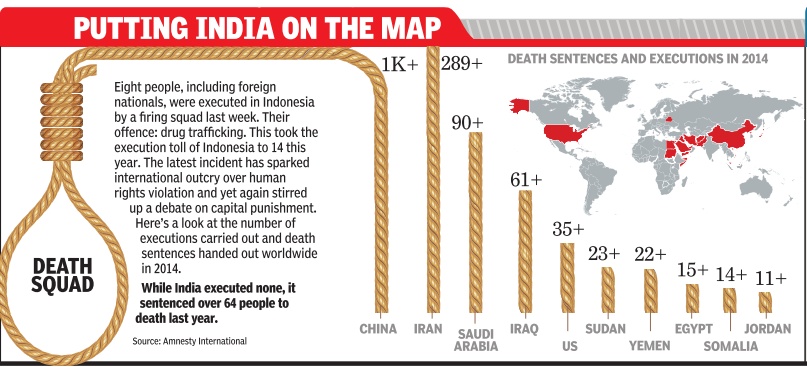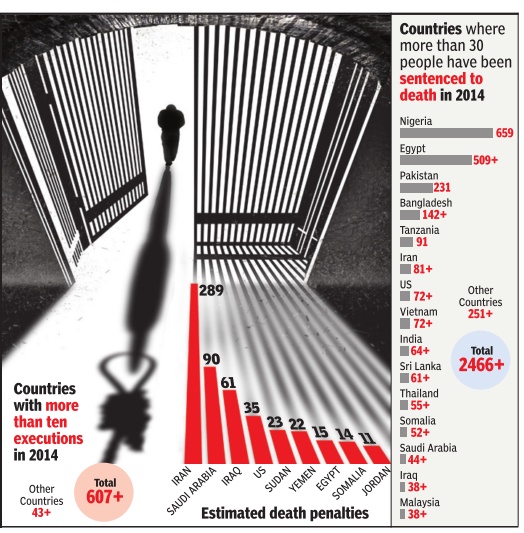Capital punishment: South Asia
(→Convicts can not be hanged secretly and hurriedly: SC) |
|||
| Line 1: | Line 1: | ||
[[File: capital punishment india.jpg|Capital punishment, India and the world: 2014; Graphic courtesy: [http://epaperbeta.timesofindia.com//Gallery.aspx?id=03_05_2015_017_067_002&type=P&artUrl=PUTTING-INDIA-ON-THE-MAP-03052015017067&eid=31808 ''The Times of India'']|frame|500px]] | [[File: capital punishment india.jpg|Capital punishment, India and the world: 2014; Graphic courtesy: [http://epaperbeta.timesofindia.com//Gallery.aspx?id=03_05_2015_017_067_002&type=P&artUrl=PUTTING-INDIA-ON-THE-MAP-03052015017067&eid=31808 ''The Times of India'']|frame|500px]] | ||
| − | [[File: death sentence 2014.jpg|Death sentence, India, Pakistan, Bangladesh, Sri Lanka and the world: 2014, Graphic | + | [[File: death sentence 2014.jpg|Death sentence, India, Pakistan, Bangladesh, Sri Lanka and the world: 2014, Graphic courtesy: [http://epaperbeta.timesofindia.com//Article.aspx?eid=31808&articlexml=STATOISTICS-MARKED-FOR-DEATH-10042015009011 ''The Times of India'']|frame|500px]] |
{| Class="wikitable" | {| Class="wikitable" | ||
Revision as of 11:12, 22 August 2015


This is a collection of articles archived for the excellence of their content. |
Contents |
2008: SC bench split on Swamy Shraddhanand

The Times of India, Jul 29 2015
Even in 2008, SC bench was split on confirming death
Pradeep Thakur
Two judges of the apex court may have differed on the procedure followed in hearing Yakub Memon's curative petition but there has been precedence where an apex court bench had given conflicting opinions on confirmation of death penalty , raising questions on the capital punishment jurisprudence. In 2008, a two-judge SC bench in Swamy Shraddhanand vs Karnataka was divided over confirming death penalty, though both the trial court and the high court were unanimous on the case.
The SC then constituted a three-judge bench to decide the matter. The larger bench stayed the death penalty for conflict of opinion in the twojudge SC bench. The threejudge bench then commuted the sentence to life imprisonment. The bench observed that life imprisonment, subject to remission, was grossly disproportionate and inadequate to the crime committed.This laid the foundation of penal option of imprisonment for the rest of convict's life without remission.
The Swamy Shraddha nand judgment helped death convicts escape the noose in many other cases such as Haru Ghosh vs State of WB, UP vs Sanjay Kumar, Sebastian vs State of Kerala, Gurvail Singh vs State of Punjab. In all these cases, death penalty was commuted to full life or determinate number of years.
In the Swamy Shraddhanand verdict, the SC had observed that where the judges “may feel somewhat reluctant in endorsing the death penalty... the court would take recourse to the expand ed option“. The expanded option being jail for the rest of life without remission. Making a case for abolition of death penalty , a paper of the Law Commission had observed the SC had in the past admitted its own death penalty jurisprudence was arbitrary .It quoted the Bacchan Singh vs State of Punjab case of 1980, which established the `rarest of rare' doctrine, where the SC had admitted that death penalty was awarded arbitrarily .
2014: Death sentence
Apr 10 2015
A recently released report of Amnesty International on death sentences and executions in 2014 says that capital punishment is being used at an alarming rate because of perceived threats to states' safety because of terrorist activities and internal instability. For instance, Pakistan lifted a six-year moratorium on the death penalty after the Peshawar school attack. The organization estimates that at least 2,466 death sentences were awarded in 2014, 28% more than in 2013. In India, at least 64 were awarded the death sentence in 2014, but no executions were carried out Source: Amnesty International, reliable data not availabe for China, North Korea and South Sudan
Convicts can not be hanged secretly and hurriedly: SC
India Today May 28 2015
AmitAnand Choudhary
`They Must Be Allowed To Exhaust All Legal Remedies, Meet Family'
Condemned prisoners also have a right to dignity, the Supreme Court has said holding that execution of death sentence cannot be carried out in an arbitrary , hurried and secret manner without allowing convicts to exhaust all legal remedies and meet family members. “Right to life under Article 21 of the Constitution does not end with the confirmation of the death sentence. Even in cases of death row convicts, their right to dignity must be protected,“ said a bench of Justices A K Sikri and U U Lalit while quashing the execution warrants of a young woman and her lover, convicted for killing seven members of her fam ily, including a 10-month-old baby , in Uttar Pradesh in 2008.
The observations assume significance in the context of the hue and cry raised by human rights activists after Parliament attack convict Afzal Guru was hanged in the capital's Tihar jail in 2013 even before his family members could get the intimation.
In the case of the couple -Shabnam and Saleem -the bench said, “We find that death warrant was signed by the sessions judge in haste without waiting for convict to exhaust all legal remedies.“ It pointed out that the condemned prisoners can file a review petition before the SC and can also seek mercy from the the President or governor.
Referring to the Allahabad HC order on the procedure to be followed for execution of death sentence, the bench said that principles of natural justice must be followed and sufficient notice given to the convict before the issuance of death warrant to enable himher to pursue legal recourse and have a final meeting with family members. In cases where a convict is not in a position to get legal assistance, legal aid must be provided, it said.
The bench expressed surprise on the “unwarranted“ haste with which the Amroha court issued execution warrants, just six days after the SC awarded death to the couple on May 15 for wiping out the woman's entire family to remove opposition to their affair and grab family property.
The apex court said the sessions court issued the warrant without waiting for the mandatory 30 days to allow death row convicts to avail judicial remedy of filing petitions for a review.
SC approves death sentence in kidnapping for ransom
The Times of India, Aug 22 2015
Death sentence okay in kidnapping for ransom: SC
AmitAnand Choudhary
The Supreme Court upheld the constitutional validity of Section 364A of Indian Penal Code making kidnapping for ransom an offence punishable by even death sentence saying the provision is crucial as terrorists resort to such activities to force governments to meet their demands. A three-judge bench of Justices T S Thakur, R K Agrawal and Adarsh Kumar Goel said the provision was incorporated as it was not only criminals but terrorist organizations which commit such crimes.
“Given the background in which the law was enacted and the concern shown by Parliament for the safety and security of the citizens and the unity , sovereignty and integrity of the country, the punishment prescribed for those committing any act under Sec tion 364A cannot be dubbed as so outrageously disproportionate to the nature of the offence as to call for the same being declared unconstitutional,“ it said.
The bench, however, said such extreme punishment be awarded in the rarest of rare cases and only where a terrorist was involved in kidnapping.
“Where the act which the accused is charged with is proved to be an act of terrorism threatening the very essence of our federal, secular and democratic structure may possibly be the only other situations where courts may consider awarding the extreme penalty . But, short of death in such extreme and rarest of rare cases, imprisonment for life for a proved case of kidnapping or abduction will not qualify for being described as barbaric or inhuman,“ the bench said.
Death penalty and government
Dhananjay Mahapatra | TNN
FROM THE ARCHIVES OF ‘‘THE TIMES OF INDIA’’: 2008
SC stand against terror often negated by govt
Every single death sentence awarded by Supreme Court makes news. The extreme penalty is handed down only in rarest of rare cases relating to heinous crimes which reflect the nadir of human depravity and senselessness.
Death penalty is awarded after careful scrutiny of evidence by all three courts — subordinate, high court and Supreme Court. But, that is not the end of the road for a condemned convict. He could still send mercy pleas to the President or the governor, as the case may be, and bide his time during its pendency. In the courts presided over by terrorists, however, legal procedures are redundant. Death sentences get awarded to unknown number of innocents the moment they assemble a bomb and plant it in crowded places. The dance of death unfolds in public at the press of a remote. For, the extreme law followed by terrorists has no chapter on mercy jurisprudence.
Every blast leaves children orphaned, women widowed and parents to grieve a lifetime over their lost children. Communal harmony gets ruptured. A community gets slandered. Translated in the law of the land, this denotes mass murder, treason and spreading disharmony in society, all of which under Indian Penal Code are categorised as heinous crimes. What should, then, be the punishment for terrorists indulging in these acts simultaneously?
Since 1987, the Supreme Court has made a strong pitch for adequate punishment for terrorists. In the Mahesh vs State of MP [1987 (2) SCR 710] case, it had refused to reduce the accused’s death sentence to life imprisonment.
It said, “It will be a mockery of justice to permit the accused to escape the extreme penalty of law when faced with such evidence and such cruel acts. To give lesser punishment for the accused would be to render the justice system of the country suspect. The common man will lose faith in the courts. In such
cases, he understands and appreciates the language of deterrence more than the reformative jargon.”
This paragraph is quoted in another oft-referred judgment — Sevaka Perumal vs State of Tamil Nadu [1991 SCC (3) 471]. The latter is a reference point for many a judgment of the Supreme Court, right upto this year. In Perumal case, the apex court said a murder committed due to deep seated personal rivalry may not call for death penalty. “But, an organised crime or mass murder of innocent people would call for imposition of death sentence as deterrence,” it had said.
Undue sympathy and imposing inadequate sentence would do more harm to the justice system, which would lead to loss of public confidence in the efficacy of law, the court had said. “It is the duty of every court to award proper sentence having regard to the nature of the offence and the manner in which it was executed or committed,” it had said.
The courts may have eschewed “undue sympathy” in awarding death sentence to terrorists — be it Davinder Pal Singh Bhullar in the Maninderjit Singh Bitta bomb attack case or Mohd Afzal in the Parliament attack incident. But, when it comes to executing the death penalties, the government, irrespective of the party in power, invariably develops cold feet.
This political cold feet appears to have erased the deterrent element that the apex court stressed so strongly, time and again, while making it a point to award adequate punishment for crimes. This dithering on government’s part, as India gets increasingly targeted by terrorists, could have a disastrous impact on the nation.
The SC had said, “Security of persons and property of the people is an essential function of the State. It could be achieved through instrumentality of criminal law. Undoubtedly, there is a cross cultural conflict where living law must find answer to the new challenges and the courts are required to mould the sentencing system to meet the challenges.”
Terrorism and bomb blasts have posed a grave new challenge to criminal law administrators — the government and the courts. The courts appear to be on course correction mode by applying deterrence jurisprudence. Will the governments follow suit?